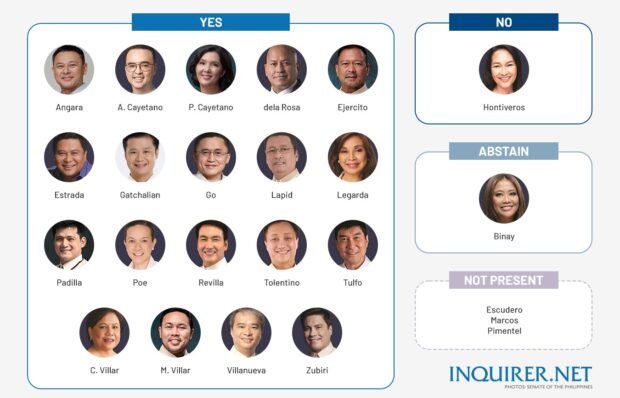How did senators vote and eventually approve Maharlika bill?

Image: INQUIRER.net / Samuel Yap
MANILA, Philippines — It was hours past midnight when the Senate made the unsurprising move to approve the controversial Maharlika Investment Fund bill, asserting its commitment to pass the measure within its timeline prior to Congress’ sine die adjournment on June 2, 2023.
Voting 19-1-1, Senate passed the proposed MIF Act, more than a week after President Ferdinand Marcos Jr. certified it as urgent.
Forgoing the constitutional requirement of a three-day period between the second and third reading is allowed for bills deemed urgent by the President.
But before senators made their votes known, Senator Risa Hontiveros said she thought the chamber would be deciding the fate of the proposed measure during the session on Wednesday.
This, she said, was because they had yet to receive a clean copy of the MIF bill in its final form.
Article continues after this advertisement“And also, (because) I was looking forward to the minority leader (Koko Pimentel) being able to participate in the vote on second reading. Anyway, the bill is certified as urgent, and we could approve it on second and third reading to allow him tomorrow to participate and also manifest his vote,” she said.
Article continues after this advertisementBut Senate President Juan Miguel Zubiri said, there was already a schedule for the bicameral conference to reconcile the conflicting provisions of Senate and House at 11 a.m. on Wednesday.
So the hours-long session that began Tuesday afternoon all ended with the eventual approval of the contentious proposal, bringing it a step closer to becoming a law.
Hontiveros went against the tide and voted against the proposed MIF.
Senator Nancy Binay abstained.
READ: Controversial Maharlika bill clinches final Senate approval
Pimentel, along with Senator Francis Escudero and presidential sister Senator Imee Marcos, were not on the floor to cast their votes.
But all three lawmakers have previously been vocal about their lingering concerns about the measure.
READ: Imee Marcos, Escudero: Passing Maharlika bill shouldn’t be done in haste
Who voted yes?
After proposing and embedding amendments in the MIF bill, the following senators voted for the passage of the measure:
- Senate President Juan Miguel Zubiri
- Senate President Pro Tempore Loren Legarda
- Senate Majority Leader Joel Villanueva
- Senator Mark Villar (MIF bill sponsor)
- Senator Cynthia Villar
- Senator JV Ejercito
- Senator Sonny Angara
- Senator Alan Cayetano
- Senator Pia Cayetano
- Senator Ronald dela Rosa
- Senator Jinggoy Estrada
- Senator Sherwin Gatchalian
- Senator Christopher Go
- Senator Lito Lapid
- Senator Robin Padilla
- Senator Grace Poe
- Senator Ramon Revilla Jr.
- Senator Francis Tolentino
- Senator Raffy Tulfo
Hontiveros’ sole ‘no’ vote
Hontiveros, a staunch critic of the MIF bill, hailed the rigorous amendments done to the original Senate Bill 2020.
“I think we were wise to sense the uncertainties of the times and to act on that intuition. So again, congratulations to everyone,” she said.
Hontiveros took part in proposing changes to the MIF bill, so why did she vote against it?
“In the end, we still have this Maharlika Investment Fund, into which scarce public resources will be poured. And, of course, I will not enumerate here, again the multiple crises that cry urgently for resources,” she explained.
The lawmaker noted, however, she believes in the need for a “new kind of public financing.”
But she said the concept of establishing a sovereign wealth fund is “ahead of its time,” and this will only make sense in a few years when the country is enjoying surpluses.
“At this time, I think that what we need is to capitalize our government-owned-and-controlled corporations (GOCCs), so that they can venture where the private sector hesitates to go into – utility scale batteries, cold storage for fish and vegetables, and public utility vehicle modernization,” Hontiveros pointed out.
For her, MIF is not intended for such a purpose.
“At a later time, years from now, after the GOCCs have soaked up the little capital that we have and solved the problems that are most real to Filipinos — it is at that point, I think, that the capabilities of a sovereign wealth fund would have come into consideration,” the senator said.
“At that point, the wealth of publicly funded innovations and businesses already earning their keep can be handed over to the private sector through the financial facilitation of a Maharlika Investment Fund, so that a new round of public investments by our GOCCs and their venture partners can then begin again. For these reasons, I vote no,” said the opposition lawmaker.
RELATED STORIES:
Senators clash over move to end interpellations on Maharlika bill
Senate minority again tries in vain to take away Maharlika bill from Villar-led panel